
Frontiers in Cardiovascular Medicine
Scope & Guideline
Elevating Cardiovascular Research Through Open Access.
Introduction
Aims and Scopes
- Cardiovascular Disease Mechanisms:
Focuses on understanding the underlying biological and physiological mechanisms that contribute to various cardiovascular diseases, including ischemic heart disease, heart failure, and arrhythmias. - Innovative Therapeutics and Interventions:
Explores novel therapeutic strategies, including pharmacological treatments, device-based interventions, and surgical techniques aimed at improving outcomes for patients with cardiovascular conditions. - Diagnostic and Imaging Technologies:
Covers advancements in diagnostic methodologies and imaging technologies, such as echocardiography, magnetic resonance imaging, and computed tomography, to enhance the assessment of cardiovascular health. - Epidemiology and Public Health:
Investigates the epidemiological aspects of cardiovascular diseases, focusing on risk factors, preventive strategies, and the impact of lifestyle and socioeconomic factors on cardiovascular health. - Translational Research:
Emphasizes the translation of basic science discoveries into clinical applications to improve patient outcomes in cardiovascular care. - Patient-Centered Approaches:
Promotes research that evaluates patient perspectives, quality of life, and outcomes in cardiovascular care, ensuring that patient needs and experiences are central to cardiovascular research.
Trending and Emerging
- Artificial Intelligence and Machine Learning:
There is a growing trend in the application of artificial intelligence and machine learning techniques for predicting outcomes, diagnosing diseases, and personalizing treatment in cardiovascular medicine. - Cardio-Oncology:
Research focusing on the intersection of cardiovascular health and cancer treatment is gaining traction, addressing the cardiotoxic effects of cancer therapies and the management of cardiovascular disease in cancer patients. - Integrated Multidisciplinary Approaches:
A shift towards integrated care models that encompass cardiology, endocrinology, nephrology, and other specialties to address the multifactorial nature of cardiovascular diseases is becoming increasingly prevalent. - Personalized and Precision Medicine:
Emerging interest in tailoring cardiovascular treatment strategies based on genetic, phenotypic, and lifestyle factors, promoting individualized patient care in cardiovascular medicine. - Regenerative Medicine and Stem Cell Therapy:
Research into the use of stem cells and regenerative therapies to repair and regenerate cardiac tissue is on the rise, reflecting a shift towards innovative treatment modalities. - Telemedicine and Remote Monitoring:
An increase in studies focusing on telemedicine and remote patient monitoring technologies, particularly in the context of managing chronic cardiovascular diseases and during the COVID-19 pandemic.
Declining or Waning
- Traditional Pharmacological Approaches:
There is a noticeable decline in research focused solely on traditional pharmacological treatments for cardiovascular diseases, as newer therapies and combination approaches gain prominence. - Basic Science Studies Without Clinical Relevance:
Research primarily focused on basic science without clear translational implications appears to be decreasing, as the journal emphasizes studies that bridge the gap between laboratory findings and clinical applications. - Isolated Risk Factor Studies:
Studies that examine single risk factors in isolation, such as hypertension or hyperlipidemia, are becoming less frequent, with a shift towards more integrative approaches that consider multiple interacting factors. - Surgical Interventions Without Technological Integration:
Research on traditional surgical methods without the incorporation of new technologies or techniques has seen a decline, as the field moves toward more innovative, technology-driven approaches.
Similar Journals

CANADIAN JOURNAL OF CARDIOLOGY
Leading the Way in Cardiac Health InsightsCanadian Journal of Cardiology (ISSN: 0828-282X, E-ISSN: 1916-7075), published by Elsevier Science Inc, serves as a vital platform for disseminating high-quality research in the dynamic field of cardiology and cardiovascular medicine. Since its inception in 1985, this journal has established itself as a leader in the field, currently holding a prestigious Q1 ranking in Cardiology, indicating its significant impact and contribution to medical science. With a Scopus rank of #50 out of 387 in its category and placing in the 87th percentile, the journal showcases rigorous peer-reviewed articles that advance knowledge and practice in cardiology. Although the journal is not open access, it provides valuable insights and research findings that cater to clinicians, researchers, and students who are committed to improving cardiovascular health. As we approach the convergence of years to 2024, the Canadian Journal of Cardiology continues to strive for excellence, facilitating a discourse vital for both academic and clinical advancements in cardiology.
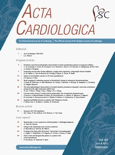
ACTA CARDIOLOGICA
Illuminating the path to better cardiovascular care.ACTA CARDIOLOGICA is a distinguished journal published by TAYLOR & FRANCIS LTD, focusing on the dynamic fields of Cardiology and Cardiovascular Medicine. Established in 1946, the journal has maintained a significant presence in the academic community, providing a platform for cutting-edge research and clinical studies that aim to address challenges in cardiovascular health. With its Q3 rating in both Cardiology and General Medicine categories, it showcases a robust compilation of articles that reflect the evolving landscape of cardiac care. Although ACTA CARDIOLOGICA is not an Open Access journal, it continues to serve a vital role for researchers, professionals, and students dedicated to advancing knowledge in cardiovascular health. This journal, with an ISSN of 0001-5385 and E-ISSN of 1784-973X, is a critical resource for those looking to stay updated on the latest developments and practices in the specialization, contributing significantly to the field until 2024 and beyond.

Nepalese Heart Journal
Empowering Heart Health Through Collaborative ResearchNepalese Heart Journal, published by the CARDIAC SOC NEPAL, serves as a premier platform for disseminating knowledge in the field of cardiology and cardiovascular health. With an ISSN of 2091-2978, this journal aims to bridge the gap between researchers, clinicians, and academicians by presenting high-quality, peer-reviewed articles that address clinical practices, innovative research, and emerging trends in heart disease management, especially within the context of Nepal and the surrounding region. Although it operates under a traditional publishing model, its commitment to excellence aids in reinforcing the scientific discourse in an area critical to public health. The journal is a valuable resource for professionals and students alike who are focused on advancing their understanding of cardiology and its implications for health policy and practice. Exploring the intersections of local challenges and global advancements in heart health, the Nepalese Heart Journal is poised to contribute meaningfully to the evolving landscape of cardiovascular research.
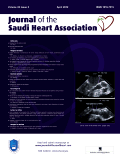
Journal of the Saudi Heart Association
Fostering Innovation in Cardiology for Global ImpactThe Journal of the Saudi Heart Association is a prominent scholarly publication dedicated to advancing knowledge in the fields of cardiology and cardiovascular medicine. Published by DIGITAL COMMONS BEPRESS, this open-access journal has been serving the global community since 2009, providing a vital platform for researchers, practitioners, and students interested in the latest developments in heart health and disease management. With an ISSN of 1016-7315 and a growing repository of knowledge alongside an E-ISSN of 2212-5043, the journal showcases an array of peer-reviewed articles that contribute to the understanding of cardiovascular conditions. Although categorized in the Q4 quartile for 2023, it remains committed to offering valuable insights, particularly within the constraints of the 29th percentile rank specified by Scopus. As the journal converges towards 2024, it continues to foster collaboration, innovation, and inquiry within the Saudi Arabian and international medical communities.
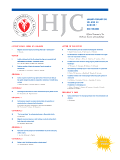
Hellenic Journal of Cardiology
Transforming Cardiac Research into Global ImpactThe Hellenic Journal of Cardiology, a peer-reviewed open-access publication under the esteemed ELSEVIER banner, proudly represents the forefront of research in the field of Cardiology and Cardiovascular Medicine. Established in 1993 and actively publishing since then, this journal has carved a niche in disseminating high-quality research and clinical insights relevant to cardiovascular health in Greece and beyond. With an impressive Q2 ranking in both Cardiology and Cardiovascular Medicine categories as of 2023, the journal holds a commendable position at Rank #126/387 in Scopus, indicative of its critical role in advancing scientific knowledge and practice. The Hellenic Journal of Cardiology transitioned to open access in 2016, ensuring that ground-breaking research is freely accessible, fostering a global dialogue among researchers, clinicians, and students alike. Its publication frequency spans significant years, providing a continuous flow of innovative findings while addressing pressing cardiovascular issues. As the journal builds on its legacy, it aspires to enrich the academic community's understanding of cardiovascular medicine, making it an invaluable resource for anyone invested in heart health.
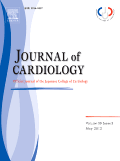
Journal of Cardiology
Innovating solutions for a world of cardiovascular challenges.Journal of Cardiology, published by ELSEVIER, stands as a prominent resource in the field of cardiology and cardiovascular medicine. With a rich history since its inception in 1987, this peer-reviewed journal aims to disseminate cutting-edge research that enhances the understanding and treatment of cardiovascular diseases. Its 2023 ranking places it in the Q2 category within its discipline, reflecting its significance and impact, as evidenced by a Scopus rank of #123 out of 387 journals, positioning it in the 68th percentile of its field. The journal is headquartered in Japan, providing a unique perspective on cardiological advances relevant not only to the Asian continent but also globally. Though it does not currently offer open access, the Journal of Cardiology remains a vital institutional resource for researchers, clinicians, and students seeking to push the boundaries of cardiovascular science and improve patient outcomes.
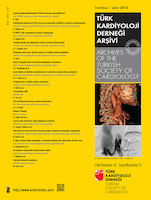
Turk Kardiyoloji Dernegi Arsivi-Archives of the Turkish Society of Cardiology
Advancing cardiovascular knowledge for a healthier tomorrow.Turk Kardiyoloji Dernegi Arsivi-Archives of the Turkish Society of Cardiology is a prominent peer-reviewed journal dedicated to advancing the field of cardiology and cardiovascular medicine. Published by KARE PUBL, this journal has established itself as a key resource for researchers, healthcare professionals, and students since its inception in 1990. As an Open Access journal since 2017, it ensures that cutting-edge research and clinical findings are readily accessible to a global audience, thus fostering collaboration and knowledge sharing among the cardiology community. With its recent rank in the Q3 quartile for Cardiology and Cardiovascular Medicine in 2023, and a Scopus rank of #282 out of 387, the journal is positioned to enhance its influence in the cardiovascular field, offering valuable insights and promoting evidence-based practices. The journal covers a wide range of topics within cardiology and cardiovascular research, making it an essential platform for scholars aiming to contribute to the ongoing dialogue in this vital area of medicine. For those eager to stay updated with the latest research trends and clinical practices in cardiology, Turk Kardiyoloji Dernegi Arsivi represents a crucial resource.

Netherlands Heart Journal
Exploring Innovations in Heart Health and Disease ManagementNetherlands Heart Journal is a premier academic publication dedicated to advancing knowledge in the field of cardiology and cardiovascular medicine. Published by BOHN STAFLEU VAN LOGHUM BV, this journal has established itself as a critical platform for researchers, professionals, and students seeking to explore groundbreaking findings and innovative practices in cardiovascular health. With an ISSN of 1568-5888 and E-ISSN 1876-6250, the journal boasts a respectable Q2 ranking in the Cardiology and Cardiovascular Medicine category, placing it in the top half of its field according to the 2023 quartiles. The Scopus ranking places it 130th out of 387 in the relevant category, indicating a commendable percentile rank of 66th, which attests to its influence and quality of published research. Spanning from 2005 to 2024, the journal endeavors to include a diverse array of topics, encompassing clinical practice, technological innovations, and public health considerations related to cardiovascular diseases. Researchers and practitioners are encouraged to engage with the journal's robust content, contributing to and benefiting from the collaborative effort to enhance cardiovascular health worldwide.

Arquivos Brasileiros de Cardiologia
Advancing cardiovascular knowledge for a healthier tomorrow.Arquivos Brasileiros de Cardiologia is a leading open-access journal dedicated to advancing the field of cardiology and cardiovascular medicine. Established in 1950 and published by the ARQUIVOS BRASILEIROS CARDIOLOGIA, this Brazilian journal plays a crucial role in disseminating high-quality research that addresses both emerging and established topics in cardiovascular science. With an impressive history and a commitment to open access since 1997, it provides researchers, healthcare professionals, and students with free and readily available content that significantly contributes to the understanding and management of cardiovascular diseases. The journal is indexed in Scopus and holds a Q3 ranking in the category of Cardiology and Cardiovascular Medicine, demonstrating its relevance and participation within the global research community. Researchers can submit their work and access a wealth of information that spans a variety of subfields, reflecting the journal’s dedication to fostering innovation and collaboration within cardiology. With a mailing address at Avenida Marechal Câmara, 160-330 Centro, Rio de Janeiro, RJ 20,020-907, Brazil, the journal continues to serve as a vital platform for scholarly communication and knowledge exchange in the cardiovascular realm.
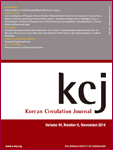
Korean Circulation Journal
Fostering Evidence-Based Practices in Cardiovascular Care.Korean Circulation Journal, published by the Korean Society of Cardiology, has established itself as a prominent platform for disseminating research in the fields of Cardiology and Cardiovascular Medicine. With an ISSN of 1738-5520 and an E-ISSN of 1738-5555, this journal has been at the forefront of cardiovascular science since its inception in 2006 and is projected to continue until 2024. The journal's commitment to quality is reflected in its 2023 category quartiles, ranking in the second quartile (Q2) for both Cardiology and Internal Medicine, as well as its commendable Scopus rankings within the respective fields. Located in South Korea, the journal aims to bridge the gap between cutting-edge research and practical applications, serving as an invaluable resource for researchers, healthcare professionals, and students keen on advancing their understanding of cardiovascular health. Although currently not an open-access journal, it provides a wealth of knowledge that encourages evidence-based practice in clinical settings.